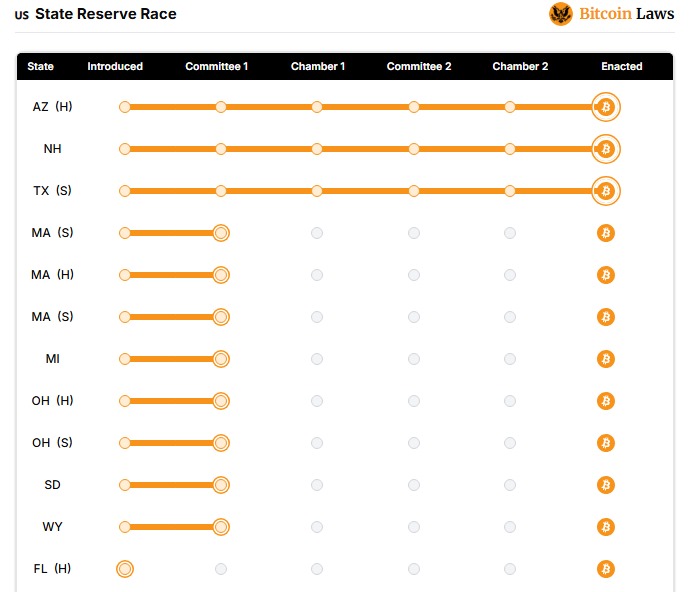Quick Breakdown
- Florida is reigniting the debate over crypto’s role in public finance with its newly reintroduced Bitcoin Reserve Bill.
- If passed, the law would allow the state to invest up to 10% of its funds in digital assets, including Bitcoin, ETFs, NFTs, and blockchain-based products.
- With Texas, Arizona, and New Hampshire already setting similar examples, Florida’s move could strengthen its image as a crypto policy trailblazer. At the same time, it could expose the state to the unpredictable nature of digital asset markets.
- In today’s financial landscape, where states compete for digital relevance, the Florida crypto bill represents both an opportunity and a cautionary tale. Innovation can drive growth, but only if it is rooted in accountability and trust.
The State’s New Crypto Gamble
House Bill 183, part of the Florida crypto bill filed in October 2025, marks the state’s bold return to digital finance after an earlier version, HB 487, was withdrawn earlier this year. Unlike the first attempt, this updated version introduces stricter rules around custody, documentation, and fiduciary standards to address earlier concerns about transparency and risk exposure.
If passed, the law would take effect on July 1, 2026. It would authorize the State Board of Administration to allocate pension and trust funds into digital assets. This time, Representative Barnaby expanded the range of eligible investments beyond Bitcoin to include other crypto assets, signalling a strategic move from single-asset speculation toward diversified digital exposure.
Florida’s reentry comes amid a wave of national interest in state-level Bitcoin reserves. Some states have already introduced similar legislation on a smaller scale. Collectively, these efforts mark what could be a turning point—the gradual institutionalization of crypto in public finance.
Also Read: What Florida’s Withdrawal of Bitcoin Reserve Bill Means for the Future of State-Invested Crypto
From Pension Funds to Protocols: The Stakes Are High
The Florida crypto bill is an ambitious step toward financial diversification. It’s not necessarily a reckless gamble, but it is certainly a high-stakes move. Allocating even a small share of state reserves to Bitcoin could, in theory, improve long-term returns and strengthen fiscal resilience.
The goal seems less about chasing quick profits and more about adapting to a changing financial world where digital assets are too significant to ignore. Still, the stakes are enormous. Pension funds, which make up part of the proposed investment pool, are among the most tightly regulated and socially sensitive types of public capital.
Any major drop in the crypto market could cause real losses for retirees and state employees. That raises serious questions about fiduciary responsibility, market volatility, and overall risk management.
Innovation or Irresponsibility?
The Florida crypto bill sits at a crossroads between innovation and risk. On one hand, it reflects a forward-looking approach to modern finance and digital asset adoption. On the other hand, it faces the challenge of crypto’s inherent instability, with price swings of 10% or more occurring within days.
Such volatility puts pressure on the long-held principle that public funds should prioritize safety and stability over aggressive returns. However, the bill does include built-in safeguards such as custodial oversight, regular audits, and strict investment limits, all designed to minimize potential risks.
Ultimately, this initiative could be seen as a careful experiment. It will test whether a state can responsibly integrate digital assets into its financial system without undermining long-term security.
The State-Level Bitcoin Race: Texas, Arizona, and Beyond
Florida isn’t venturing into this digital space alone. It’s stepping into what is fast becoming a state-level Bitcoin race across the United States.
Texas has already taken the lead with Senate Bill 21, which officially created the Texas Strategic Bitcoin Reserve. This aligns perfectly with Texas’s long-standing pro-crypto stance and its reputation as a Bitcoin mining hub.
Meanwhile, New Hampshire has introduced its own version of a digital reserve under House Bill 302, which allows up to 10% of public funds to be invested in digital assets with a market capitalization above $500 billion—a requirement that currently only Bitcoin meets.
Arizona has chosen a more cautious approach. House Bill 2749 channels unclaimed property funds into a digital reserve, showing interest in crypto diversification but with a more measured attitude.

Although most other states are still experimenting with proposals, this growing movement reflects a new kind of competition reminiscent of the 19th-century Gold Rush. The difference this time is that the race is not for physical gold, but for digital value.
Florida’s decision to look beyond Bitcoin and include a broader range of crypto assets could give it an advantage, potentially positioning the state as a trailblazer in America’s evolving digital finance landscape.
A Digital Gold Rush or Fool’s Gold?
The Florida crypto bill captures a widening ideological divide in U.S. economic policy, between those who favour cautious preservation and those who push for bold innovation. On one side, the proposal acknowledges the lasting influence of crypto on the global financial system. On the other hand, it highlights the tension between progress and prudence, especially when taxpayer money is involved.
If the initiative succeeds, Florida could become a key crypto hub for institutional finance, attracting blockchain firms, custodians, and fintech innovators. It could even inspire neighbouring states to introduce similar laws, triggering a ripple effect across the nation.
But the risks cannot be ignored. Bitcoin’s volatility, shifting regulations, and unclear tax rules could leave these investments exposed. Florida’s ability to manage risk, maintain transparency, and enforce compliance will determine whether this move becomes a model for progress or a lesson in overconfidence.
At this point, the Florida crypto bill looks more strategic than speculative. It recognizes that crypto is here to stay and that state treasuries must adapt to a rapidly changing financial order.
Will Florida Strike Digital Gold or Find Fool’s Gold Instead?
Florida’s Bitcoin Reserve Bill could become much more than just a policy experiment. It might symbolize a larger financial shift, where digital assets begin competing directly with traditional instruments such as bonds and equities in public portfolios.
Whether it sparks a genuine “digital gold rush” or turns into a cautionary tale will depend entirely on how well it is executed. If Florida manages to balance innovation with responsibility, it could redefine how governments engage with the digital economy. But if the plan fails, it could reinforce doubts about crypto’s place in public finance.
The world is watching closely, and other states may soon follow Florida’s lead into this new digital frontier.
Disclaimer: This article is intended solely for informational purposes and should not be considered trading or investment advice. Nothing herein should be construed as financial, legal, or tax advice. Trading or investing in cryptocurrencies carries a considerable risk of financial loss. Always conduct due diligence.
If you want to read more market analyses like this one, visit DeFi Planet and follow us on Twitter, LinkedIn, Facebook, Instagram, and CoinMarketCap Community.
Take control of your crypto portfolio with MARKETS PRO, DeFi Planet’s suite of analytics tools.”





















